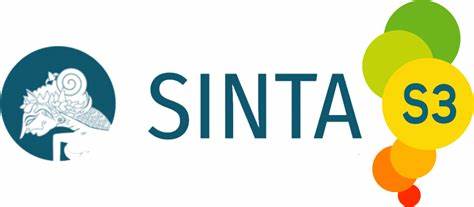TECHNOLOGY-MEDIATED TASK-BASED LEARNING (TTL) TO IMPROVE STUDENT’S PRODUCTIVE SKILLS IN PRIMARY SCHOOL
Keywords:
Technology; TBLT; Speaking; Writing; Primary SchoolAbstract
English language skills, especially speaking and writing, are essential since it can help the students to express their ideas and thoughts. However, developing these skills takes work and require serious effort. The combination of technology and technology-mediated task-based learning (TBLT) is a suitable formula to improve speaking and writing skills, especially for students in elementary schools. This is a mixed-method study where qualitative and quantitative approaches complement each other. A total of 56 4th-grade elementary school students who were divided into experimental groups (n-28) and control groups (n-28) became participants in this study. The data collection techniques used were tests, observation, and interviews. Meanwhile, for data analysis, this study used statistical analysis for quantitative data and content analysis for qualitative data. The results indicate that the use of technology-mediated task-based learning had an effect on students' speaking and writing skills. This can be seen from the statistical test results of Asymp. Sig two-tailed (0.037) that is lower than 0.05. In addition, using Technology-mediated task-based learning has several advantages, including creating exciting learning and increasing students' engagement. However, several challenges must also be considered, including teacher creativity in designing and the need for students to adapt to the implemented design.
References
Albarqi, G. (2024). Investigating EFL oral production in a technology mediated TBLT context. Journal of China Computer-Assisted Language Learning, 0(0), 1–29. https://doi.org/10.1515/jccall-2023-0030
Alwasilah, A. C. (2013). Policy on Foreign Language Education in Indonesia. International Journal of Education, 7(1), 1–19.
Andon, N. (2018). Optimal Condition for TBLT. In TBLT as a Researched Pedagogy. https://doi.org/10.31004/basicedu.v5i1.653
Andrade, M. S. (2009). The Effects of English Language Proficiency on Adjustment to University Life. International Multilingual Research Journal, 3(1), 16–34. https://doi.org/10.1080/19313150802668249
Artini, L. P. (2017). Rich Language Learning Environment and Young Learners’ Literacy Skills in English. Lingua Cultura, 11(May), 19–24. https://doi.org/10.21512/lc.v11i1.1587
Aubrey, S., King, J., & Almukhaild, H. (2020). Language Learner Engagement During Speaking Tasks : A Longitudinal Study. RELC Journal, 1–15. https://doi.org/10.1177/0033688220945418
Baecher, L., Artigliere, M., Patterson, D. K., & Spatzer, A. (2012). Differentiated Instruction for English Language Learners as “Variations on a Theme”: Teachers Can Differentiate Instruction to Support English Language Learners. Middle School Journal, 43(3), 14–21. https://doi.org/10.1080/00940771.2012.11461807
Branden, K. Van Den. (2016). The Role of Teachers in Task-Based Language Education. Annual Review of Applied Linguistics, 36, 164–181. https://doi.org/10.1017/S0267190515000070
Bryfonski, L., & McKay, T. H. (2019). TBLT implementation and evaluation: A meta-analysis. Language Teaching Research, 23(5), 603–632. https://doi.org/10.1177/1362168817744389
Cahyati, P., & Madya, S. (2019). Teaching English in Primary Schools: Benefits and Challenges. Advances in Social Science, Education and Humanities Research, 326(Iccie 2018), 395–400. https://doi.org/10.2991/iccie-18.2019.68
Chen, K. T. C. (2021). The Effects of Technology-Mediated TBLT on Enhancing the Speaking Abilities of University Students in a Collaborative EFL Learning Environment. Applied Linguistics Review, 12(2), 331–352. https://doi.org/10.1515/applirev-2018-0126
Chin, K. Y., & Wang, C. S. (2021). Effects of augmented reality technology in a mobile touring system on university students’ learning performance and interest. Australasian Journal of Educational Technology, 37(1), 27–42. https://doi.org/10.14742/ajet.5841
Creswell, J. W. (2013). Qualitative, Quantitative, and Mixed-Methods Research. In Sage Publication. Sage. https://doi.org/10.1128/microbe.4.485.1
Dörnyei, Z. (2014). Researching complex dynamic systems: ‘Retrodictive qualitative modelling’ in the language classroom. Language Teaching, 47(1), 80–91. https://doi.org/10.1017/S0261444811000516
East, M. (2021). Foundational Principles of Task-Based Language Teaching. Routledge.
Ellis, R. (2003). Designing a task-based syllabus. RELC Journal, 34(1), 64–81. https://doi.org/10.1177/003368820303400105
Ellis, R. (2019). The Methodology of Task-Based teaching. 79–101. https://doi.org/10.4324/9780429197352-1
Ellis, R., Skehan, P., Li, S., Shintani, N., & Lambert, C. (2019). Task-based language teaching: Theory and practice. In Task-Based Language Teaching: Theory and Practice (Issue 2016). https://doi.org/10.1017/9781108643689
Falah, I. F., Apsari, Y., & Kusumah, R. (2023). The Challenges of English Teachers in Teaching English at Primary Schools. Journal of English Education and Teaching, 7(4), 832–846. https://doi.org/10.33369/jeet.7.4.832-846
Falah, I. F., Suherdi, D., & Muslim, A. B. (2023). An Inspired-TBLT Framework to Enhance Students’ Speaking Performances in EFL Context. Journal of English Education and Teaching, 7(2), 217–234.
Hamied, F. A., & Musthafa, B. (2019). Policies on language education in Indonesia. Indonesian Journal of Applied Linguistics, 9(2), 308–315. https://doi.org/10.17509/ijal.v9i2.20279
Iveson, J. D. (2019). Task-based Language Teaching Frameworks in Technology Enhanced Learning. Lancaster University, July.
Kemendikbud Ristek. (2022). Capaian Pembelajaran Mata Pelajaran Bahasa Inggris Fase A-Fase F. Badan Standar, Kurikulum, Dan Asesmen Pendidikan Kementerian Pendidikan, Kebudayaan, Riset, Dan Teknologi Republik Indonesia, 23.
Kim, N. (2019). Challenges and Trials: Implementing Localized TBLT for Novice L2 Learners Throughout Three Semesters. English Teaching, 74(3), 113–139. https://doi.org/10.15858/engtea.74.3.201909.113
Kim, Y., Jung, Y., & Tracy-Ventura, N. (2017). Implementation of a Localized Task-Based Course in an EFL Context: A Study of Students’ Evolving Perceptions. TESOL Quarterly, 51(3), 632–660. https://doi.org/10.1002/tesq.381
Levy, M. (2006). Effective Use of Call Teachnologies: Finding the Right Balance. In Changing Language Through CALL (pp. 1–15).
Lie, A. (2017). English and Identity in Multicultural Contexts: Issues, Challenges, and Opportunities. TEFLIN Journal - A Publication on the Teaching and Learning of English, 28(1), 71. https://doi.org/10.15639/teflinjournal.v28i1/71-92
Littlewood, W. (2007). Communicative and task-based language teaching in East Asian classrooms. Language Teaching, 40(3), 243–249. https://doi.org/10.1017/S0261444807004363
Long, M. H. (2016). In Defense of Tasks and TBLT: Nonissues and Real Issues. Annual Review of Applied Linguistic, 36, 5–33.
Mgboro, C. U., Otubo, F. ., & Uda, H. . (2019). Enhancing Teacher Creativity Using Digital Technology. Journal of Education and Practice, 10(27), 16–21. https://doi.org/10.7176/jep/10-27-03
Musthafa, B., & Hamied, F. A. (2014). Theoretical Overview: Teaching English as A Foreign Language In Indonesia Schools in the Reform Era: What do Teachers Have to Say? The New English Teacher, 8(2), 14.
Nunan, D. (2004). Task-Based Language Teaching. In Cambridge University Press. https://doi.org/10.1017/cbo9780511667336
Oskoz, A., & Elola, I. (2014). Promoting foreign language collaborative writing through the use of Web 2.0 tools and tasks. In Technology-mediated TBLT (pp. 115–148).
Richard, J. C. (2017). Teaching Listening and Speaking: From Theory to Practice. In Cambridge University Press.
Wang, Y.-C. (2022). Implementing Technology-Mediated Task-Based Language Teaching in an EFL Writing Course. International Journal of Computer-Assisted Language Learning and Teaching, 12(2), 1–15.
Willis, D., & Willis, J. (2011). Doing Task-Based Teaching. Oxford University Press, 131.
Yahya, M. Y. (2019). Improving Speaking Performance and L2 Motivation Through Task-based Language Teaching on Malaysian Undergraduate Students. In University of Reading (Issue October). https://centaur.reading.ac.uk/89016/%0Ahttps://centaur.reading.ac.uk/89016/1/23864619_Yahya_thesis_redacted.pdf
Zein, S. (2018). Elementary English education in Indonesia : Policy developments , current practices , and future prospects. English Today, 33(1), 53–59. https://doi.org/10.1017/S0266078416000407
Zein, S. (2016). Factors affecting the professional development of elementary English teachers. Professional Development in Education, 42(3), 423–440. https://doi.org/10.1080/19415257.2015.1005243
Downloads
Published
Issue
Section
License

This work is licensed under a Creative Commons Attribution-ShareAlike 4.0 International License.
The author is responsible for acquiring the permission(s) to reproduce any copyrighted figures, tables, data, or text that are being used in the submitted paper. Authors should note that text quotations of more than 250 words from a published or copyrighted work will require grant of permission from the original publisher to reprint. The written permission letter(s) must be submitted together with the manuscript.




